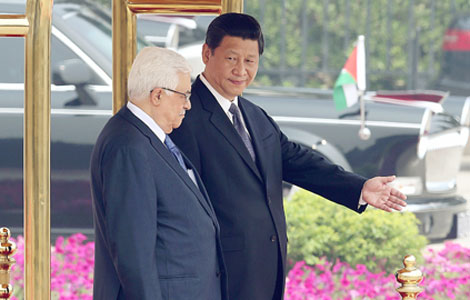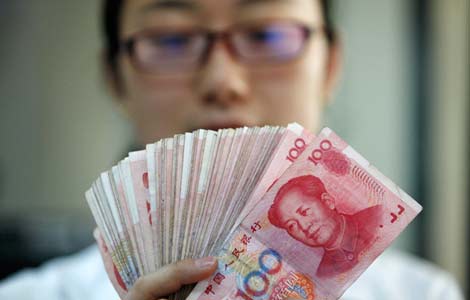NY mayor's tobacco fight sets example for Chinese cities
Updated: 2013-03-21 11:10
By Chen Weihua (China Daily)
|
||||||||
Mayor Michael Bloomberg's proposed legislation to require that New York retailers hide cigarettes from customers has sparked debate beyond his city, all the way to China.
Bloomberg announced the plan this week, days after a state judge struck down his bid to ban sugary drinks of over 16 ounces from certain establishments because it hadn't been approved by city lawmakers. The mayor vowed that his administration will appeal the ruling.
Two bills presented to the city council on Wednesday would allow stores to display tobacco products only when they're being bought or restocked. Cigarettes, cigars and chewing tobacco would have to be kept in drawers, cabinets, under the counter, behind a curtain or otherwise concealed from customers.
Tobacco-product displays encourage smoking, especially among the young, Bloomberg believes.
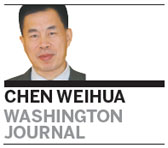
"Such displays suggest that smoking is a normal activity and they invite young people to experiment with tobacco. This is not a normal activity," he said.
This mayoral public-health corrective is the first of its kind in the US. Iceland, the United Kingdom and many Canadian provinces have already prohibited tobacco displays from most kinds of retail establishments.
This is the latest battle in Bloomberg's war on tobacco. In 2011, he extended the city's smoking ban to parks and beaches. The seventh-richest man in the US (No 13 in the world, according to Forbes) has donated $600 million of his own money to anti-smoking efforts.
According to the local health officials, New York City has seen a significant drop in smoking by adults, from 21.5 percent in 2002 to 14.8 percent in 2011. But the rate of young smokers has remained at 8.5 percent since 2007. In 2011, about 28,000 students in the city's public high schools tried smoking for the first time.
Cigarette prices in the city are among the highest in the United States. With state and local taxes adding $5.85, a pack of smokes can fetch $12 or more.
Bloomberg, who previously waged - with mixed success - public-health battles over salty snacks and trans fats in restaurant food, believes his policies have helped New Yorkers live longer, healthier lives.
"Life expectancy in our city is now three years longer than it was in 2001 and more than two years longer than the national average," said the 71-year-old mayor, who will step down in December after 12 years in office.
US health experts have hailed it while merchants and tobacco companies have expressed scorn, but New York's proposed ban has drawn attention in China.
"I really hope we have mayors and government leaders like Bloomberg," said Xiao Li of Shanghai.
China ratified the World Health Organization tobacco-control framework convention in 2005, pledging to ban smoking in indoor public spaces starting in January 2011. The promise hasn't been kept, however.
To make up for this loss of face, eight central government bodies formulated the China Tobacco Control Program (2012-15) in December, vowing to meet the indoor-smoking-ban obligation within three years while reducing amount of land allocated for growing tobacco.
Promises like these have been made many times in the past, at various levels of officialdom. Typically, they fall by the wayside due to a lack of enforcement and the power of the tobacco industry.
Last Sunday, Tianjin's Municipal Health Bureau imposed measures to curb smoking by doctors in the workplace, reflecting how tough an issue this is in China.
To many people, the latest initiative lacks force. For example, there is no requirement that cigarette packs include graphic images of blackened lungs or rotted teeth, as in other countries with anti-smoking campaigns.
Official figures show that China has over 300 million smokers, while another 700 million Chinese are regularly exposed to secondhand smoke. Every year, about 1.2 million people in China die from smoke-related diseases.
While the huge health costs tied to smoking have alarmed many in China, tobacco has long been a big source of government revenue, accounting for about 6.7 percent of total tax receipts in 2011. Tobacco is an economic pillar for provinces such as Yunnan, Hunan and Guizhou.
Xiao, the Shanghai resident, finds it annoying when people at nearby tables in a restaurant are puffing away.
"The city, which aspires to be an international metropolis like New York, has not seen an ambitious leader like Bloomberg," she said.
Contact the writer at chenweihua@chinadailyusa.com
Most Viewed
Editor's Picks

|

|
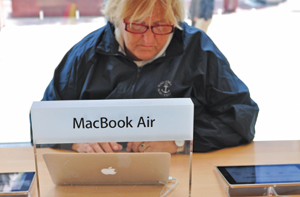
|
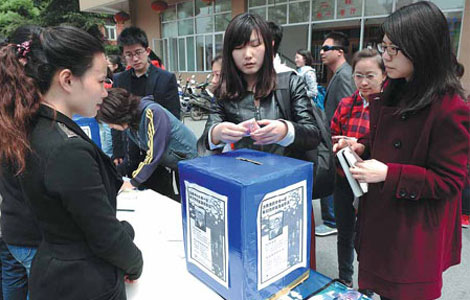
|

|

|
Today's Top News
US urged not to take sides over Diaoyu Islands
Detention of petitioners denounced
Lawyers get an advocate
Pentagon accusation on China's military rejected
Foster homes for homeless children
Public hearing to discuss taxi fare increase
21 Party officials, SOE managers disciplined
Clarity on tax evasion needed, lawmakers told
US Weekly

|

|



